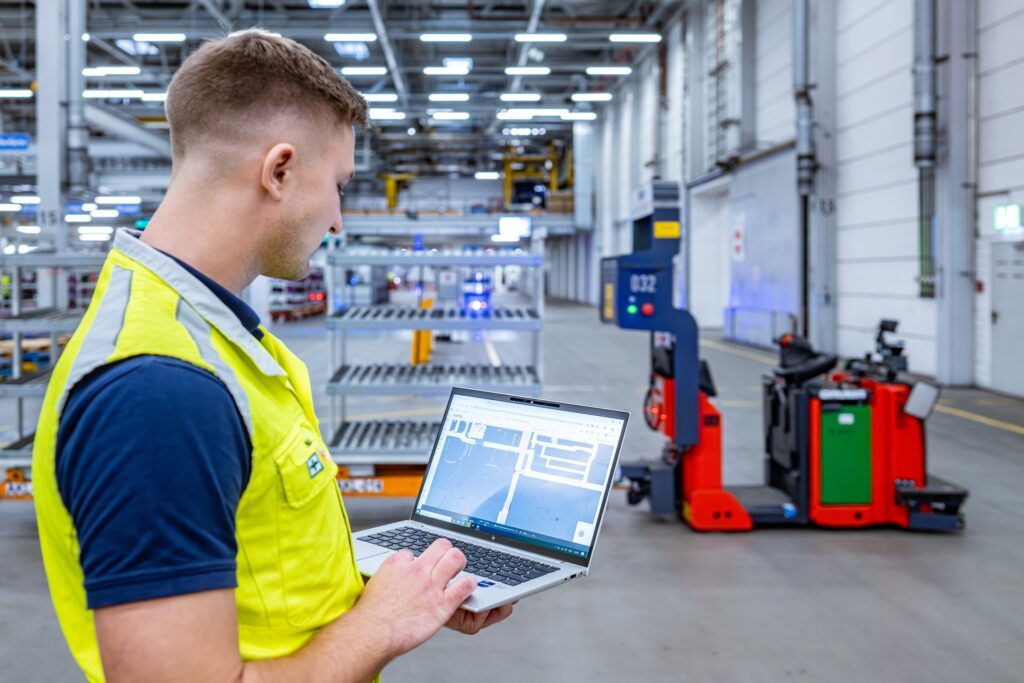Digital, automated, and intelligently connected through the cloud: BMW Group Plant Regensburg is advancing the digitalization and automation of its logistics – as a further milestone on the road to the digital factory of the future, the BMW iFACTORY. Every 57 seconds, a new vehicle rolls off the assembly line. Each one is unique, built to individual customer preferences from thousands of separate components. Every workday, up to 1,400 BMW X1 and BMW X2 vehicles are dispatched to customers worldwide, including classic combustion-engine vehicles, plug-in hybrids, and fully electric models.
The logistics behind this process are extremely complex: The components and individual parts required for production always need to be in the right place in the plant’s vehicle assembly at the right time – delivered “just in time” and in the correct order, “just in sequence” – to create individually customized vehicles for customers. At the BMW Group site in Regensburg, this logistical task, which is essential for efficient production, is primarily handled by driverless, automated or autonomous transport systems that are intelligently connected through a cloud-based traffic control system known as BMW Automated Transport Services (ATS). In some cases, the loading and unloading of transport vehicles is also fully automated.
Depending on the transport task, various types of driverless vehicles are used. For example, automated tugger trains transport small parts from the warehouse to the assembly line, while larger components weighing up to a tonne are handled by Smart Transport Robots (STR). These flat transport robots, developed by the BMW Group in collaboration with the Fraunhofer Institute for Material Flow and Logistics (IML) about ten years ago, now operate autonomously using dedicated AI modules. Relying on sensors and software, the devices recognize their surroundings, allowing them to navigate around obstacles independently when oncoming traffic permits.
The transport devices are managed through the central cloud-based BMW traffic control system, ATS. When it is time to replenish supplies, an employee on the assembly line rotates the change frame with the empty parts containers and uses it to operate a so-called retrieval rocker. The control system then receives the signal indicating that new parts need to be delivered. In this way, the control system enables smooth and precisely timed delivery of materials, as well as maintaining intelligent traffic flow in the assembly hall. It also provides optimal route guidance, based on delivery priorities, and ensures transport devices are sensibly parked and their batteries sufficiently charged.
BMW Group Plant Regensburg currently enables intelligent connection between nearly 50 automated tugger trains and more than 140 Smart Transport Robots through the ATS control system. The fleet compromises both automated and autonomous devices from different manufacturers, handling approximately 10,000 part deliveries each workday.
“What makes this so unique are the many sequenced parts specifically tailored to each customer vehicle. They must all be delivered in the order they are installed on the assembly line. Even a brief system failure in the supply of sequenced parts would bring production to a halt – and, of course, that is something we want to avoid,” says Thomas Dietz, responsible for process improvement and quality management for Physical Logistics. “A lot of detailed work on both hardware and software was needed to reach the current status.”
The existing fleet is continuously being expanded to incorporate additional transport routes and vehicles. Plans are also in place to integrate additional types of autonomous vehicles into the control system, step by step, such as autonomous lifting trucks or automated forklifts. “Our vision of intelligently connected logistics, relying on a variety of different autonomous transport systems that seamlessly interact with one another – from small to extremely large – is gradually taking shape,” says Dietz.
The driverless logistics fleet is already being complemented by a recently commissioned autonomous transport vehicle in the Regensburg press shop with a payload capacity of 55 tons.
Read the full press release here.
Tags: automation logistics Regensburg